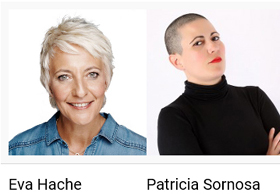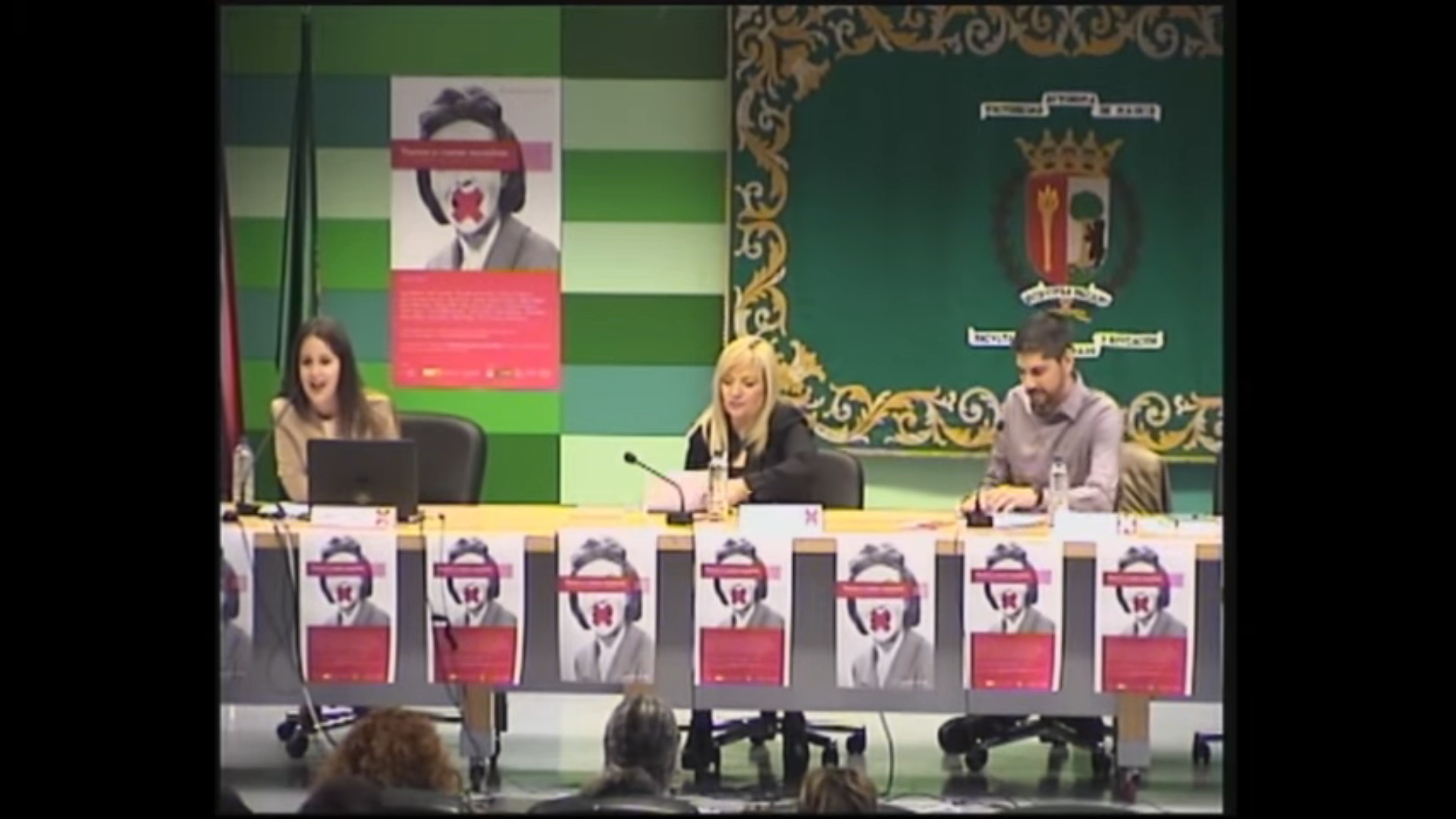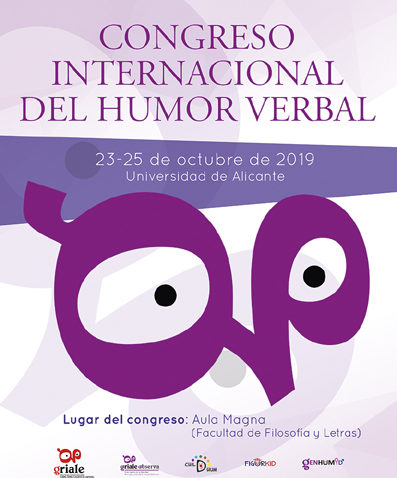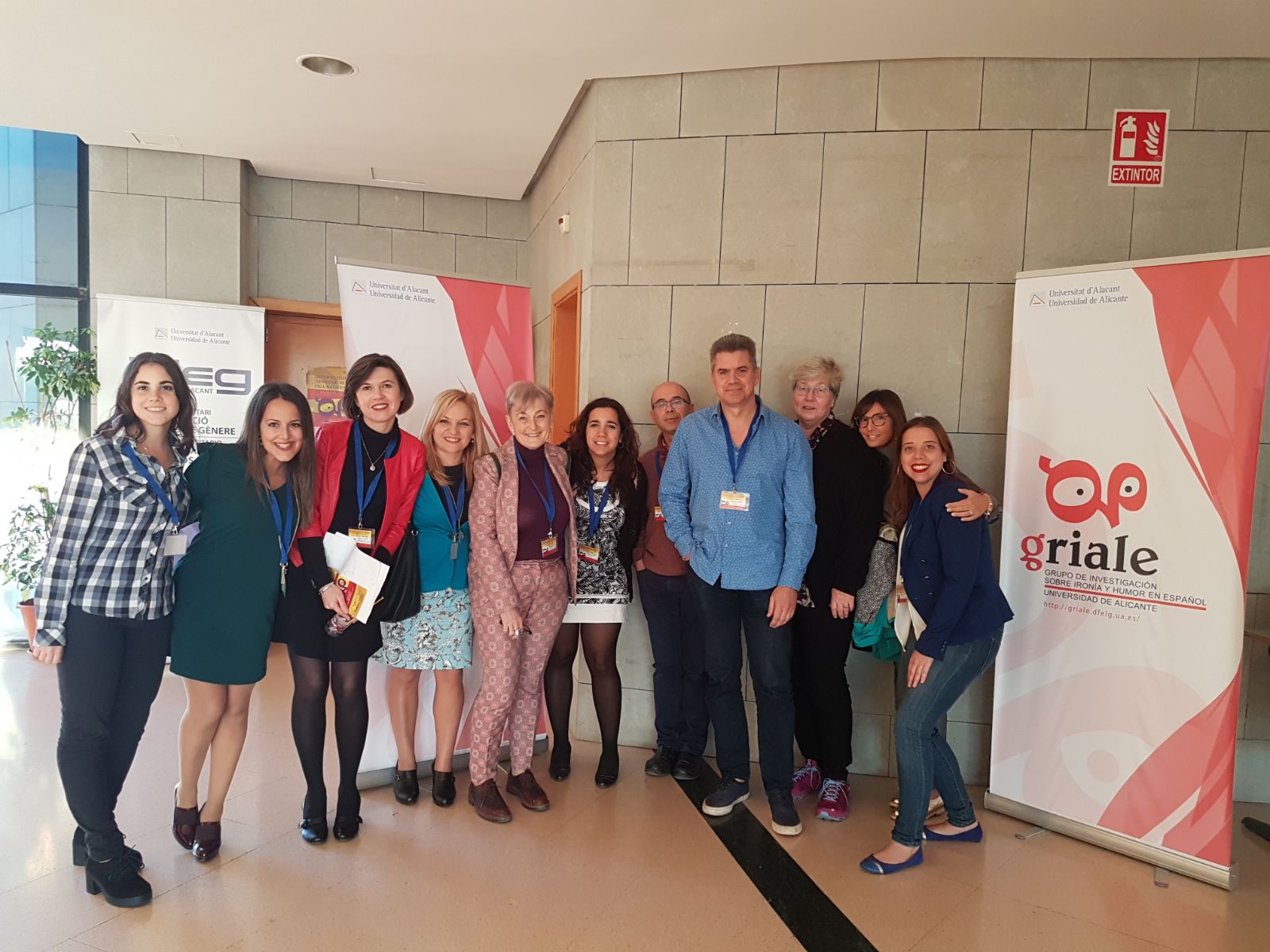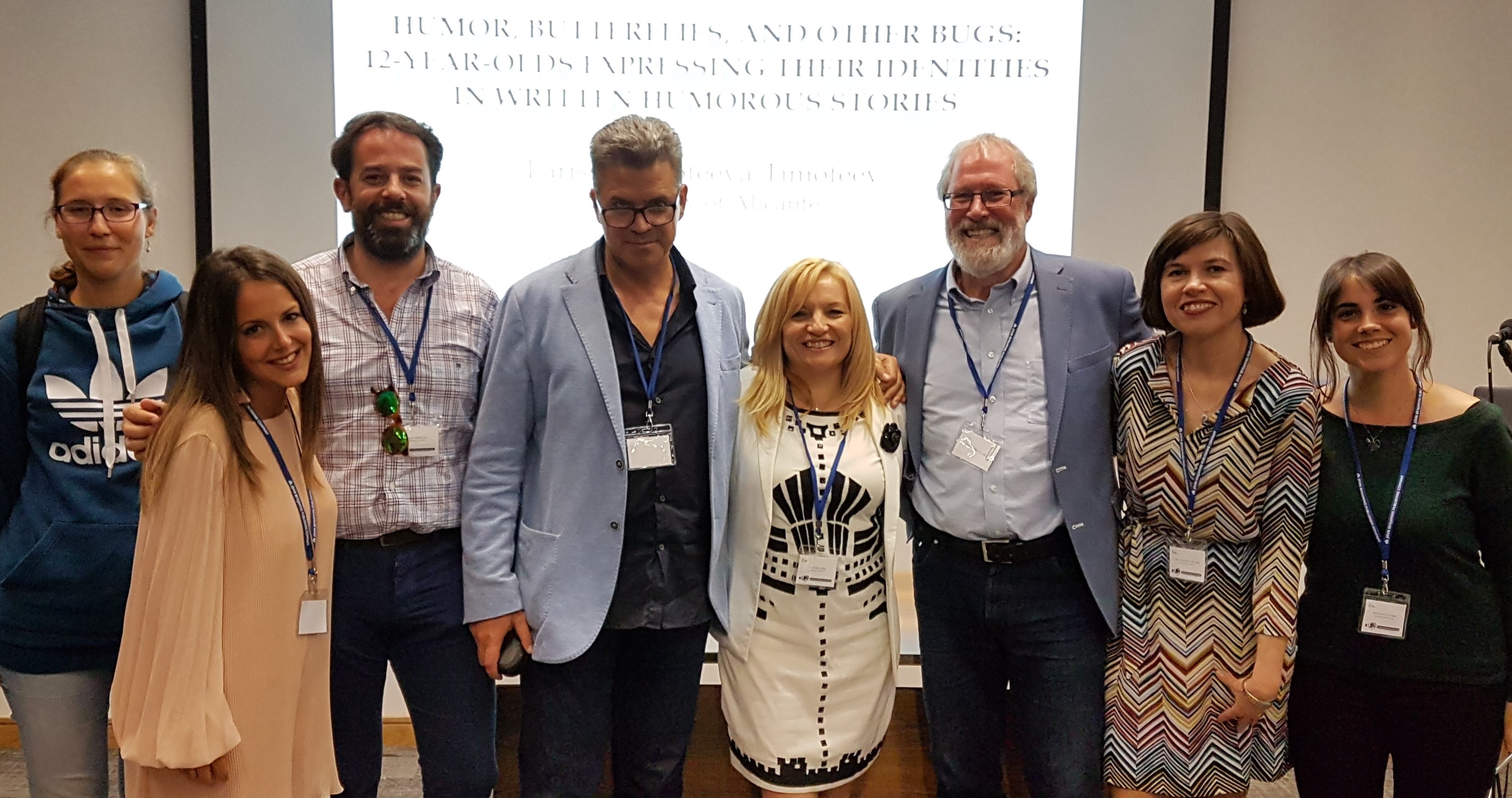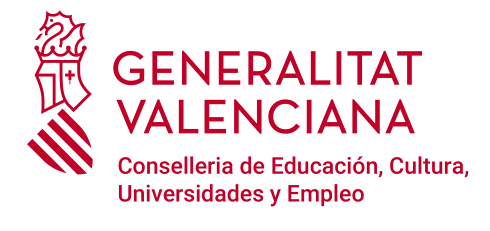Corpus for the study of «Subversive humor in Spanish stand-up comedy»
Subversive humor in Spanish stand-up comedy
Leonor Ruiz-Gurillo and Esther Linares-Bernabéu
University of Alicante (Spain). GRIALE Research Group
Abstract: This paper aims to explore subversive humor in Spanish stand-up comedy by analyzing the work of two well-known Spanish female comedians, Eva Hache and Patricia Sornosa. In order to reach this goal, a corpus of these comedians’ performances has been collected, comprising a total of 25 monologues, which have been divided into humorous sequences, which come to a total of 76 in the corpus of Eva Hache and 37 for Patricia Sornosa. The qualitative and quantitative analysis has focused on subversive humorous sequences, which has shown that only 22.38% of the sequences from Eva Hache’s comic monologues are mainly built around subverting the status quo, whereas Patricia Sornosa challenges the heteronormative discourse in most of her sequences (87.93%). Further, in this case study, we have examined the main linguistic techniques they use when challenging the heteronormative standards, namely the topics, targets, discourse strategies and linguistic cues used to generate a subversive effect. Findings show that both comics use subversive humor but in different ways because of contextual constraints. Whilst Patricia Sornosa offers an overt critique, Eva Hache disparages in a subtler manner even when teasing and undermining male power.
Keywords: subversive humor; gender; stand-up comedy; discourse strategy, target.
V Congreso Nacional de Comedia
El V Congreso Nacional de Comedia contó con la participación de la Dra. Leonor Ruiz Gurillo y de Esther Linares Bernabéu. Os dejamos en el siguiente enlace sus conferencias.
CONGRESO INTERNACIONAL DEL HUMOR VERBAL (CIHV)
http://griale.dfelg.ua.es/cihv2019
El Congreso Internacional sobre el Humor Verbal (CIHV) se celebrará en la Universidad de Alicante (España) del 23 al 25 de octubre de 2019. El grupo de investigación GRIALE, promotor de este congreso, trabaja en humor e ironía desde 2002. El congreso supone el cierre de dos proyectos de investigación (GENHUMID -FFI2015-64540-C2-1-P (MINECO-FEDER- y GRIALE Observa -PROMETEO 2016/052, Generalitat Valenciana), así como la continuación del proyecto FIGURKID -FFI2016-76047-P (AEI / FEDER, UE). De este modo, el objetivo principal del encuentro es reunir en un mismo espacio y tiempo diversos acercamientos al humor, así como compartir conocimientos sobre las últimas investigaciones acerca de la lingüística del humor y crear nuevas redes de investigación entre los diversos asistentes al encuentro.
Queremos anunciar la participación de los siguientes invitados:
Salvatore Attardo (Texas A&M University–Commerce)
Tony Veale (University College Dublin)
Victor Raskin (Purdue University)
Nancy Bell (Washington State University)
Jef Verschueren (University of Antwerp)
Neal R. Norrick (Saarland University)
Además, el CIHV es una gran oportunidad para acercar la investigación en humor al trabajo de los humoristas, los guionistas y los periodistas. En este sentido, se ha programado una mesa redonda con la participación de los siguientes invitados:
Darío Adanti (historietista e ilustrador)
Dani Alés (Monologuista)
Kap (humorista gráfico y caricaturista)
Miguel Sánchez-Romero (productor de programas audiovisuales de humor).
Asimismo, durante la celebración del CIHV se llevará a cabo la inauguración de la exposición retrospectiva Antología de Humor Social, bajo el auspicio del Vicerrectorado de Cultura, Deporte y Lenguas y con la participación de Enrique Pérez Penedo (Enrique).
Comité científico
Jef Verschueren (Universidad de Amberes)
Neal R. Norrick (Universidad de Saarland)
Dimitrij Dobrovol’skij (Academia Rusa de las Ciencias)
Delia Chiaro (Universidad de Bolonia)
Salvatore Attardo (Texas A&M University–Commerce)
Francisco Chico Rico (Universidad de Alicante)
Juan Antonio Ríos Carratalá (Universidad de Alicante)
Manuel Padilla (Universidad de Sevilla)
María Simarro (Universidad de Burgos)
Elena Méndez (Universidad de Sevilla)
Laura Alba (UNED)
Ana Mancera (Universidad de Sevilla)
Ana Pano (Universidad de Bolonia)
Elvira Manero Richard (Universidad de Murcia)
International Symposium on Intercultural, Cognitive and Social Pragmatics
Los días 2, 3 y 4 mayo se celebró en la Universidad de Sevilla la octava edición del congreso International Symposium on Intercultural, Cognitive and Social Pragmatics. Hasta allí se desplazaron las profesoras Leonor Ruiz Gurillo, Larissa Timofeeva Timofeev, Esther Linares Bernabéu, Marta Garrote Salazar y Laura Vergara Fabregat, puesto que participaban con un panel titulado “Humour through a linguistic lens”, dirigido por Larissa Timofeeva.
La profesora de la Universidad Autónoma de Madrid, Marta Garrote, habló sobre la competencia humorística en niños de 2 a 6 años, a través de un estudio realizado en el corpus CHIEDE. Así pues, se observó la relación existente entre el desarrollo de la competencia humorística con la competencia metapragmática y cómo los niños, a partir de 5 años, muestran una mayor capacidad para resolver la incongruencia en una situación humorística.
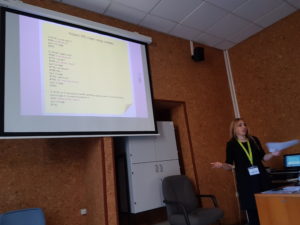
Seguidamente, las profesoras de la Universidad de Alicante, Leonor Ruiz y Esther Linares, presentaron su investigación acerca del humor subversivo en español. En concreto, mostraron una propuesta para el análisis lingüístico del humor subversivo para, posteriormente, aplicarlo en una comparación entre las monologuistas Eva Hache y Patricia Sornosa.
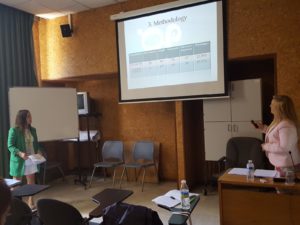
Asimismo, la comunicación presentada por la profesora de la Universidad de Alicante, Larissa Timofeeva, tuvo como tema principal el humor infantil, aunque, en este caso, la franja de edad estudiada fueron los niños y niñas de 12 años. La investigación de la profesora Timofeeva, realizada a través del corpus CHILDHUM, mostró cómo el humor verbal es un recurso muy interesante para estudiar aspectos psicológicos como la autoestima.
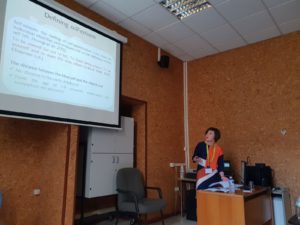
Para finalizar el panel, la profesora de la Escuela Oficial de Idiomas de Orihuela, Laura Vergara, realizó una propuesta para introducir el humor verbal en el aula de inglés como lengua extranjera. Tras mostrar los beneficios del humor para la mejora de la competencia comunicativa, Laura Vergara nos presentó una propuesta didáctica para trabajar diferentes aspectos lingüísticos a través de una sitcom británica.
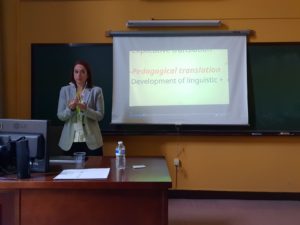
Fue un placer coincidir en el congreso con investigadores de la talla de Dan Speber, Penelope Brown y Maria Sifianou, así como compartir esos días con compañeros como Francisco Yus, Pilar Blitvich, Patricia Bou, Carmen Pérez, Carolina Figueras, José Santaemilia o Sergio Marhuenda, entre otros muchos. Desde aquí queremos dar la enhorabuena al comité organizador por el éxito del congreso, así como agradecer en especial al profesor Manuel Padilla el trato y la atención recibida. Epics fue, sin duda, ÉPICO.
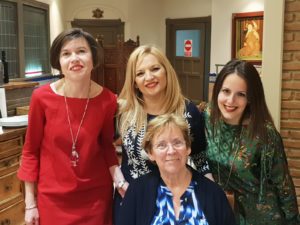
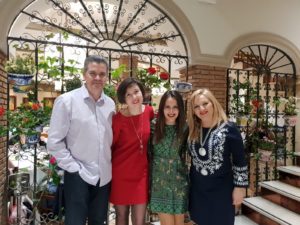
International Symposium on Figurativeness
The International Symposium on Figurativeness set the scene for the discussion of the use of figurative language in today’s communication. The event took place at the University of Alicante and it was hosted by the GRIALE research group, thanks to the support of the Faculty of Arts and the University Research Institute for Gender Studies (IUIEG), as well as to several research grants awarded by the Spanish government and the Generalitat Valenciana.
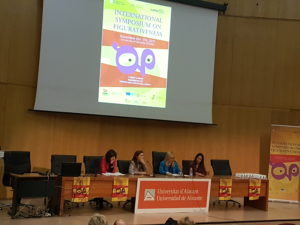
Special attention was paid to the phenomena of verbal humour and metaphor. The first keynote speaker was Delia Chiaro, professor of English language and translation at the University of Bologna. This renowned humour scholar gave a brilliant talk on the way humour is being used in the digital age and how it affects the reinforcement and subversion of gender roles and stereotypes. We found the way she described humour very interesting. In her words, humour is a cognitive and social phenomenon and, of course, humour is also something that has to do with the emotions and the performance of oneself.
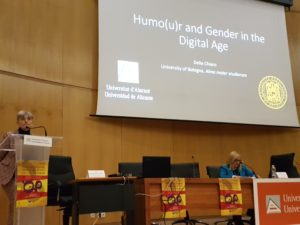
The second invited speaker, Elena Hoicka, from the Department of Psychology at the University of Sheffield, explained how important the development of humour and pretending is for the development of imagination and creativity in childhood. She showed that there were different types of early humour and a real evolution in in children’s humour comprehension and production. According to Hoicka, the use of humour and pretending reflects the infants understanding of artifacts, language, and social norms, as well as their increasingly abstract thought.
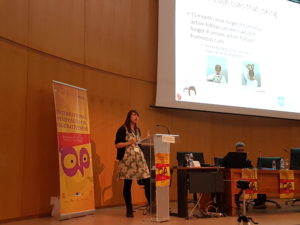
After the lunch break, Annette Myre Jørgensen of Østfold University College presented the COLA corpus, a Spanish spoken corpus of youth language, and presented some examples in which teenagers used humour and figurative language to build rapport with their interlocutor. Using Martin’s humour styles division, the speaker also exemplified those styles in conversational humour with several recordings from the COLA corpus. Then, the evening session concluded with Javier Valenzuela, from the English studies department at the university of Murcia. His study demonstrated that we can actually go from space to time via multimodality. He presented the CREATIME research project, which seeks to understand human creativity by studying how we imagine and represent time. We were all fascinated when he exposed some of the patterns for time that we have in our minds and illustrated these with data from speech and gestures collected in the media.
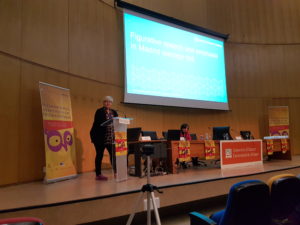
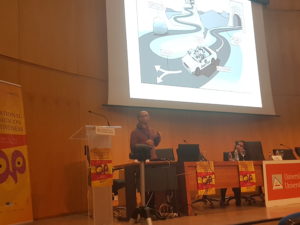
On Tuesday, Cristina Cacciari, psychologist at Università degli Studi di Modena e Reggio Emilia, explained the revision of the interference effect in metaphors and how important distributional properties are for this figurative use of language. She showed that human communication often requires the construction of meaning that goes beyond the literal one. In fact, non-literal utterances are an ever-present phenomenon in our daily communication, which imply a cognitive effort for their understanding. During her inspiring talk, Cacciari discussed the general underlying mechanisms in metaphor comprehension and the role of literal meaning when processing metaphors like “This lawyer is a shark” or “my job is a jail” in which some features of the literal meaning are applied to the figurative one.
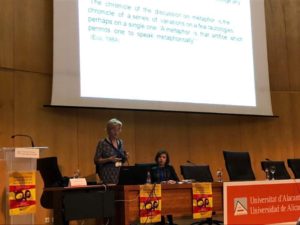
Finally, José Manuel Igoa of the Universidad Autónoma de Madrid, with expertise in Psycholinguistics, Syntax, Neurolinguistics, spoke about how we process the metaphor, with special attention to semantic-pragmatic impairments in its comprehension. In his keynote talk, he showed what involves inferring the figurative meaning when the patients have reading problems disorders. In our opinion, it was a thought-provoking talk as it posed some educational implications.
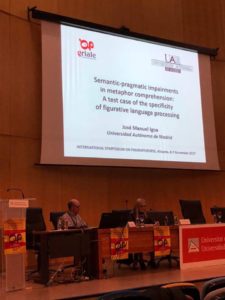
All in all, it was an engaging and enriching symposium, it was an honour to listen to all of their talks and we look forward to meeting them again soon!
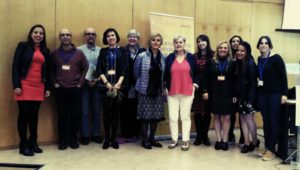
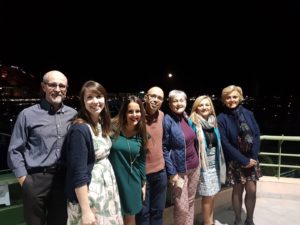
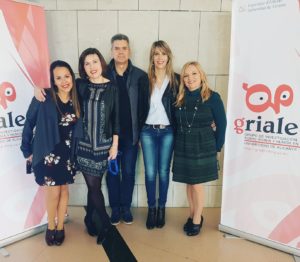
«Pragmatics in the real world»
This was the theme of the 15th International Pragmatics Conference which was held in Belfast last week. We took part in it as our colleagues Larissa Timofeeva and Leonor Ruiz Gurillo led a panel on exploring identities through humor. The panel was presented last Tuesday 18th and it was comprised of five talks divided into two slots from 15:30pm to 18:30pm. It was a great success which was proved by the large number of attendees.
Larissa Timofeeva began this panel analyzing the way children show their identity construction and self-esteem with examples taken from the corpus CHILDHUM, which contains 448 humorous narratives. Her ongoing research presented a new approach to the issue of humor acquisition.
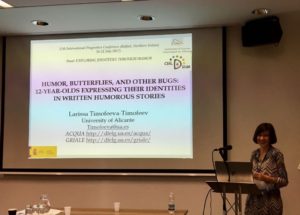
The following talk was given by Lovorka Zergollern-Miletic, who analyzed the influence of humor in the learning process. She presented the results of a questionnaire about students’ perceptions of the use of humor in the academic context. In general terms, participants were aware of the importance of humor in educational settings and they had a positive attitude to its use.
Next, Leonor Ruiz Gurillo presented her research on how Stand-up comedians depict their identity, more precisely she explored Eva Hache’s feminine identity when performing humor on stage, and examined the variety of functions achieved in 76 humorous sequences extracted from a set of 24 gendered monologues. Interestingly, the speaker applied Ducrot’s polyphonic theory and analyzed not only the feminine identity of the comedienne, but also the way Eva Hache is able to represent the male’s voice either as utterer or locutor.
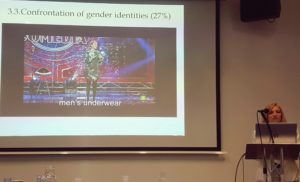
After the short break, Francisco Yus showed the link between discourse and social networks in terms of users’ identities. Indeed, he developed his talk on internet memes, since they are one of the most popular forms of internet humor in digital communication. Thanks to this presentation, we could see how memes are a phenomenon through which users can perform their virtual identity within a community.
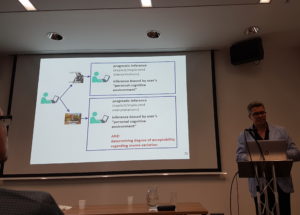
Finally, Manuel Padilla exemplified the creation and reinforcement of a local identity with the case of Cádiz carnival and the humorous elements that can be found on “chirigotas”. The best way to understand the formation of this local identity was by displaying some videos of the carnival performaces and by singing their lyrics!
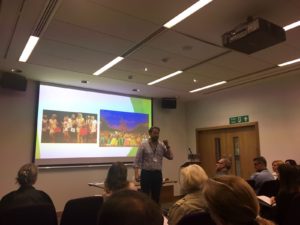
All in all, it was a fantastic experience! We shared our ideas with other pragmatists and lived unforgettable moments during those six days in Belfast. It was definitely Pragmatics in the real world.
